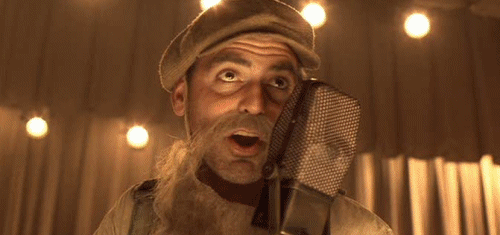We gon' be up on da floor
Part 14 of my 1000+ part series.
(For info on that, clickety-click-click)
In which I explore the roots of folk music – starting with this Bob Dylan certified (c) album.
TL;DR:
TL;DR:
 |
| Yep. |
This is so Dylan it hurts. Elliott doesn't sing for the first minute or so to instead speak his words. A cover of a song originally by Jesse Fuller (who he first gives a shout-out to at the start of the song, interestingly), it tells the story of a man whose love leaves him pining for her down by the eponymous San Francisco Bay.
TL;DR
Suuuper minimal: just a guitar and Elliott's folksy vocals.
2.) Ol' Riley
This recording also begins with a little spoken intro: this is apparently a "prison song" from down 'round East Texas. You have piqued my interest, good sir.
The song itself is around two minutes long, and it really feels like it. I WANT TO KNOW more about Riley's story.
I couldn't help but be reminded of the movie "O Brother Where Art Thou."
Rascals, the lot of 'em!
3.) The Boll Weevil
As the title suggests, this song is indeed about a boll weevil: a pesky little critter that does unspeakable things to cotton, and which 'some say comes from Mexico' I mean, they're sending drugs and rapists and all, so why not invasive species too?
 |
| All together now! |
This is another folk song not unlike later songs by Johnny Cash or Bob Dylan. A fine example of Americana.
4.) Bed Bug Blues
This one is an interesting amalgamation of blues, folk, and a touch of comedy. I mean, is there anything in this world quite as evil as bed bugs "as big as a jackass" in your bed when you just want to sleep? Oh, the humanity!
Started out stronger, but about halfway through, it became a little bit too simple and bare-bones (pun intended) for my liking.
5.) New York Town
He starts out with a shoutout to one of the greats of American folk, Woody Guthrie, who actually wrote the song. According to reputable sources (I mean, Wikipedia def counts, right?), Guthrie was one of the biggest influences on Elliott, and the two were friends.
It seems a fitting choice for Elliott, as he was originally from Brooklyn himself.
6.) Grey Goose
Clocking in at well under two minutes, even with a little spoken word intro, this song, which is sadly not about the vodka of the same name, prominently features Elliott singing "Quack quack" repeatedly. This is all I need to be happy.
Wait, there were other lyrics?
| My new look on life. |
A cover of a song originally written in 1930 by Jimmie Rodgers, this song is about a, well, mule skinner. As crazy as it is to believe, apparently that job isn't as glamorous as it sounds. This is one of the more lively and exciting songs on the album, as well as one of the longer ones, at over five minutes long. It's a pretty nifty listen - I mean, there's yodeling involved, and you should all know at this point that I'm a sucker for yodeling. I mean, WHO ISN'T?
| How could you resist this? |
8.) Cocaine
He starts out by saying that he heard this first from a blind preacher singing on the streets of Harlem. SOLD!
I have to say that this is one of the mellowest and prettiest songs about the White Stuff I've ever heard.
A bittersweet song about love and drugs. Or maybe just drugs. It's pretty, though!
| Nothing says romance quite like this |
9.) Dink's Song
Hey, it takes places around the river from Ol' Riley! #continuity
A "prison love song," as the one YouTube comment at the time of this post says, "This has heart." Hear hear, YouTuber. You said it. Here's to you, Dink. Fare thee well, oh honey.
10.) Black Baby
...should I even be listening to this song? The title alone has me feeling incredibly uncomfortable. OH WELL ONWARDS WE GO
...it's a "Southern Negro lullaby." OK, then.
I want to hear the sequel about the White Baby and the Vanilla family, sung by a Black singer. That is my response.
11.) Salty Dog
IS THIS A PIRATE SONG?
No, it most assuredly is not. No, the singer plaintively asks to be not a man at all, but your salty dog. Kinky.
This is a cover of an early 1900s folk song that's been sung by everyone under the sun, apparently. Who knew so many people had dog fetishes?
FINAL THOUGHTS:
It's interesting how he referenced Lead Belly, Jesse Fuller, and Woody Guthrie by name, as a shoutout to some quite obvious and quite apparent influences on him. I think this is a fine example of early folk in the years immediately preceding the Dylan explosion. Not exactly my thing, as it's a bit too mild and minimalistic, but I'm glad I got to listen to it.
Personal standout tracks:
"Ol' Riley," "Mule Skinner Blues," "Cocaine," "Dink's Song"
"Ol' Riley," "Mule Skinner Blues," "Cocaine," "Dink's Song"




No comments:
Post a Comment